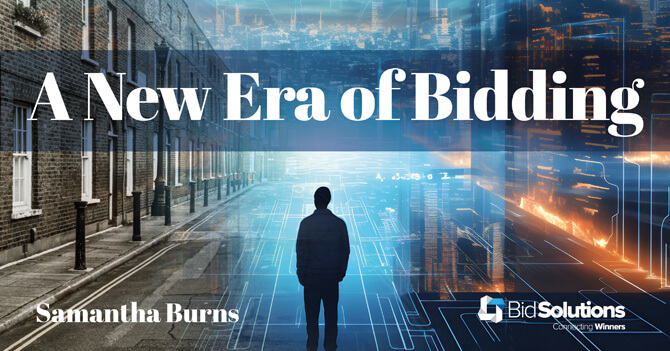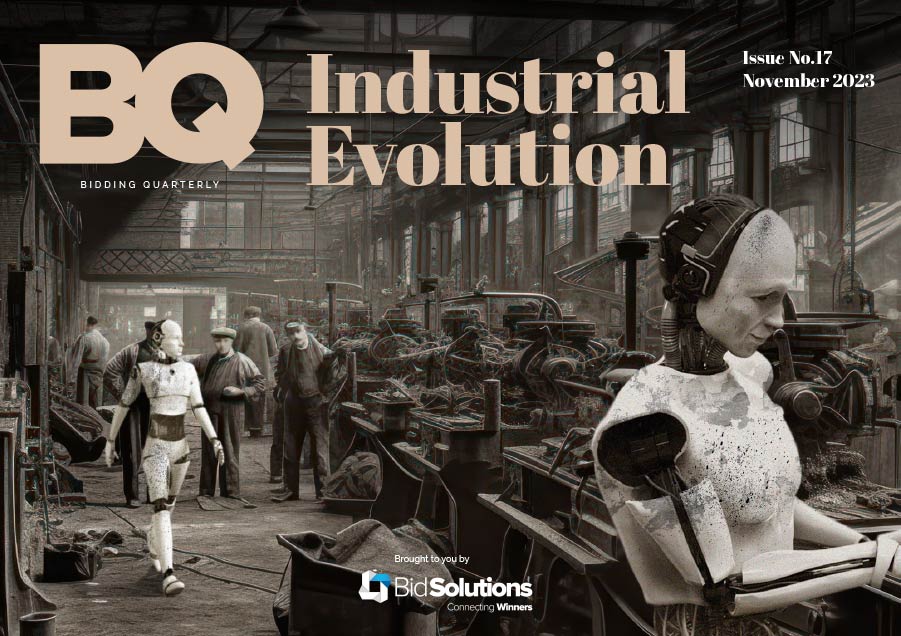
Working as a consultant, I tend to see a strong cross-section across industries and have a good overarching view of the variances. This said, what I have learnt is that proposal teams are often most largely influenced by their leaders – there seems to be a strong disconnect in most cases between process and people.
Let’s start by looking at the bird’s-eye view on industry bidding maturity
In my experience, we are seeing a shift towards more carbon focussed weighting led by the energy sector. Carbon and social value are continuing to grow as government clamps down on expectations. An interesting development is that we seem to be moving towards more specific targets within these areas, and the bidding world is becoming far more literate in being able to respond, carving out new roles and specialisms. Transport and infrastructure have become more price focussed than previous years, largely down to HS2. And the private sector seems to be catching on to some of the softer elements around social responsibility and behavioural testing. Finally, I’m largely seeing that FM and utilities remain more structured and systematic.
A bit about AI
I can’t write an article about trends without talking about AI and tech. My view on this stays relatively firm; AI will change the way we operate without question. There are already large government departments looking at AI tools to support them in procurement. It’s only a matter of time before we see AI being used in both the technical and commercial space for writing, scoring, and providing feedback. What does this mean for us as bidders? Win strategy and behavioural coaching will become more important, ‘boilerplate’ will eventually become redundant.
What are they saying on the other side of the fence?
Sukhraj Gill, a Procurement and Supply Chain industry leader has offered us the following insights:
“I often get asked and advise about the shifting dynamics of the bidding landscape by cross-sector clients. With the current climate, it is clear that the emphasis on optimising ‘value for money’ has shifted back to being a mandatory sourcing requirement. However it is important to consider that it is not just about cost, but broader value encompassing criteria such as quality and innovation. Additionally, sustainability measures such as ESG and ‘making good’ on commitments, are now becoming decisive factors in awarding contracts. Given the turbulence in global supply chains and volatile interest rates, procurement professionals are valuing bidders who demonstrate solid risk management strategies more than ever before. There is also a notable trend shifting from competition to collaboration in procurement. Instead of traditional adversarial buyer-supplier relationships, procurement teams are moving towards partnerships that prioritise collaboration.
Great levels of transparency in bid evaluations and a focus on longer term, adaptable relationships, rather than transactional ones are other emerging priorities. As the bidding environment continues to evolve, bidders who understand and align with these changes will become the leaders for innovation and supply chain transformation.“[1]
So, what are the non-negotiables in terms of skillset?
Regardless of what you are bidding for, you have to have attention to detail if you want to do well. Details are queen in bidding, as far as I’m concerned; you can have no further skills and still be an asset to the team if you pick up something I miss (which I have done, from time to time). Wider than this, communication skills are necessary – and I don’t mean being able to send an email or have a conversation. Strong communication means you can articulate exactly what you need, clearly and concisely, in a manner which preserves relationships.
People vs. process
It’s true, we are process people in bidding. We need structure, organisation and lists to truly enjoy life. Process has its place, and it’s the first thing I ask for when I go into any organisation. This isn’t because I think we should regimentally stick to process, it’s because a process can indicate the level of bidding maturity. Sometimes things get lost in process and this is where I’ve seen the biggest breakdown in internal relationships. For example, a bid manager indicates we must hit a red review by a certain date but the drafts aren’t at the required level of development yet. If we focus solely on process, this review will go ahead, and risks alienating reviewers and negatively impacting the writers. There must be room to negotiate around process because quality is the true measure of progress. Remember, process is a tool, not a rule.
Creativity = volatility
A final thought from me sits around creativity and volatility. Every team needs to have the right balance between the right- and left-hand side of the brain. The wider industry is evolving, and so are we. Having creative energy is so important to push the boundaries of ‘what good looks like’, and with that, we need to accept the volatility and differences in style and approach. There is no one size fits all, and that is only going to become truer as we enter the next era of bidding. Work to create an environment that celebrates both – I promise, your quality will improve.
[1] Sukhraj Gill is a Procurement and Supply Chain industry leader, who supports Private, Public sector and Non-profit organisations with interim procurement support, procurement transformation and strategic sourcing.
This article was written by Samantha Burns.
Sam Burns CP APMP is a Senior Bid Manager at EiB. Sam has over 11 years’ experience and has worked in both the private and public sector, helping clients win transformational projects across the UK and globally. She has a passion for technology and pioneering solutions in the full business development lifecycle.
